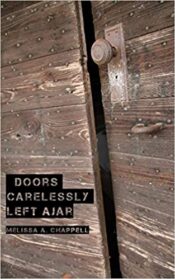A review of Melissa A. Chappell’s book, Doors Carelessly Left Ajar
 I read a lot of manuscripts for publication as part of one of my roles as editor for an indie publishing company. It takes quite a lot to stand out these days, with everyone vying for attention.
I read a lot of manuscripts for publication as part of one of my roles as editor for an indie publishing company. It takes quite a lot to stand out these days, with everyone vying for attention.
Therefore, I appreciated the solace of honesty in Melissa Chappell’s little book, Doors Carelessly Left Ajar. She is a devout person as you can tell by her acknowledgements and this lends her a brevity of candor which is often not found in the inveigling of poetry writing. There is something refreshingly simple and appealing in that approach.
Chappell’s use of language is thoughtfully considered, reflective and echoing in its resonance. I like the anonymity of it. Juxtaposed against the stark honesty, it makes for strong marriage. You have on the one hand an absence of titles and identifiable characters and then the intimacy of the emotion which is starker for its relief.
Goes without saying this is also a timely collection, as it addresses the isolation of Covid-19 times and the abandonment of norms. I appreciated the perspective of this coming from one of faith and also, deeply human, and how the author reconciles the two together.
Chappell’s language is quite fine. She knows her art well and uses her expressiveness just enough to capture a sentiment without going beyond it. She can carve her poetry precisely without needing additional words to create a feeling, and in that, she feels very much in control of what she’s doing. If you read confessional poets of which she is half and half not, you see that candor and sharpness in understanding how to employ language to create meaning in few words and Chappell has that gift. We may think this is something all writers possess but it certainly isn’t, and I can vouch for that having just read 1000 submissions for a recent anthology I worked on.
So, to present to the reader a crisp, succinct offering of emotion and responses to a period in time is much like an amuse bouche, a bouquet of small bites that whet the appetite for more. I appreciate that very much, for poets believe often that a 200-word book bursting with every word they have written is the best calling card and I would say, less is more.
On a personal note, I felt for this author. I felt her pain, her sadness, her understanding of the world, her faith resting against her heart. I could actually relate deeply to her beautiful use of language to draw the reader closer and closer to the simplicity of her feelings, which are not simple in the sense of not being deep, but rather, simple because they are fully developed and thus, wise.
On a more prosaic note, I can see clearly this is an author with a wide breadth of reading behind her and appreciation for the classics and modern poets. Why does that matter? Try reading authors who don’t read, and you’ll soon see. There is something definitive about an author who is well-read and knows her genre. She can expand her own consciousness through words in ways that transcend the metaphysical and are more about awareness than mimicry or homage. It is this which distinguishes the really matured writer from an acolyte but has nothing to do with age and everything to do with intention.
Clearly there are many poems in this collection speaking of lost love, a subject most of us find compelling time and again. It is so easy to seem hackneyed in this well-worn subject, but Chappell manages to deftly avoid cliché, I think by her instinctual word play. There is something voluminous and erotic in her ability to pair words in a sentence that leave you slightly breathless, and this style suits the subject to a tee. From the choice of opening word to how she places lines, I think she is a natural piano player, who can truly compose her own symphonies by intuiting where best they should fall. At this she excels with the virtuoso of a natural, who needs not the tuition of others to become whole. Surely a pure skill few truly possess.
I left this collection feeling as I do whenever I read really good poetry, a little sad, a little haunted, as if I had inhabited for a while, the mind and heart of another soul. Perhaps that is what poetry really does when it works and perhaps the soft kiss of words is preferable to an onslaught. I would definitely purchase this collection for a friend. It’s one of those books you really would gift because you’d know they’d feel exactly the same way. And it is that reverie I think we wish to share and impart most of all when approaching a poet’s work. In this Chappell is mistress of herself.
Approaching Christmas, I can recommend to you, this lovely little book as being the best collection of poetry I have read in a while, and one that shall stay with me long after reading. Share this with others. They will thank you for it.